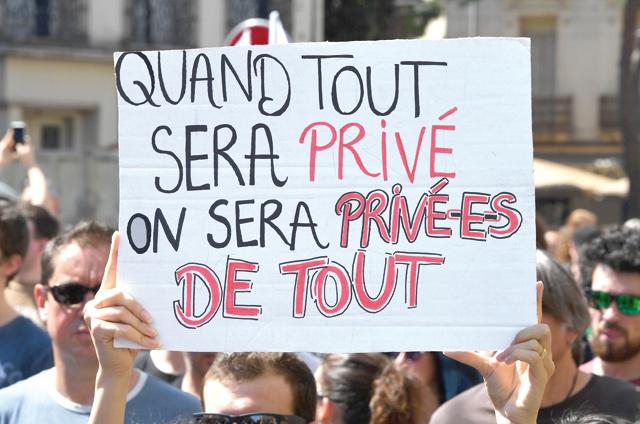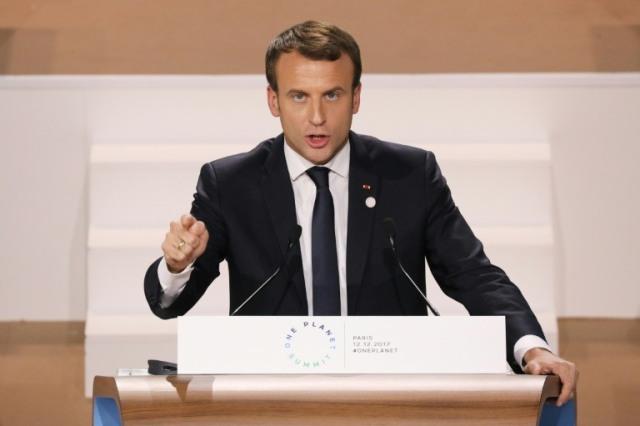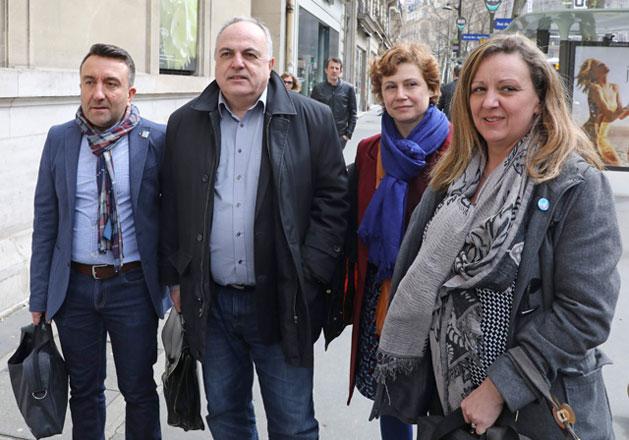You are here
France’s CGT urges broader anti-Macron protests; other unions keep their distance
By Reuters - Apr 19,2018 - Last updated at Apr 19,2018

People take part in a demonstration in Montpellier, southern France, on Thursday as part of a multi branch day of protest called by French unions CGT and Solidaires against French president's policies amid a rail strike and spreading student sit-ins. The banner reads 'When all will be private. We will be deprived of all’ (AFP photo)
PARIS — France's far-left CGT labour union sought to broaden resistance to hard-hitting economic reforms on Thursday, urging employees across the public sector to join striking railway workers in their showdown with President Emmanuel Macron.
There was no clear evidence that anything of the kind was about to happen, however, even as rolling stoppages by rail workers halted train services for the eighth day this month.
The CGT's goal is a "convergence des luttes" or "convergence of struggles" — a storm of public discontent where protests of different origins fuse into one widespread upheaval against government, something like in May 1968 or more recently at the end of 1995.
But a CGT strike call at the Paris subway train and bus group RATP appeared to have little impact: RATP management reported normal service across most of the grid.
More moderate unions involved with the CGT in the industrial action at the state-owned SNCF railway group also kept their distance from the Communist-rooted CGT as it asked others to join the protest action by striking or taking part in street marches.
"This is a political operation, not a union one," Laurent Berger, one of the most influential labour leaders in the country, said of the CGT initiative.
That not only highlighted the underlying divisions and turf battles for membership subscriptions that permanently plague the labour movement, but also more profound divergences between the Communist-rooted CGT and Berger's more reform-friendly CFDT.
Berger said his union had nothing to do with a day of street marches organised by the CGT on Thursday afternoon.
He said he did not share the CGT penchant for a "convergence of struggles" between rail workers, power sector employees, state hospital staff and even some students involved in very separate protests about university entry criteria.
While his union is backing the rail strike alongside the CGT and other unions, the CFDT is fighting Macron for concessions on debt cancellation and a new collective bargaining deal to cover rail workers when the SNCF reform ends its rail monopoly, and with it the protected job status of all future SNCF recruits.
The CGT opposes the principle of liberalisation and a pact under which all European Union governments have committed to start phasing out all passenger rail monopolies from 2020.
Forty-year-old Macron has stood firm and on Wednesday urged the unions to "stop holding the country hostage".
His government hopes union divisions will ultimately work in its favour, and the lower house of parliament this week approved the bill that enshrines most of the envisaged SNCF reforms.
Public support for the SNCF protest is weaker than for all but one of several dozen major protests over the last 20 years in France, according to an Ifop poll published last Sunday. It showed 42 per cent were sympathetic to the strikers.
That compared with much bigger support rates of two-thirds or so when strikes in late 1995 waged by rail workers snowballed into a broader public sector protest movement, forcing the government of the time to abandon rail and welfare reforms.
While polls suggest 60 per cent of the French want Macron to pursue his rail shake-up, he is walking on eggs after cutting wealth tax and housing aid and raising pensioner taxes. Those changes, the polls say, have cemented voter belief that Macron is bad for purchasing power and economic equality.
Related Articles
Paris - French state railway operator SNCF warned Sunday of major disruption caused by strikes this week that analysts say will be a major t
PARIS — Air France pilots voted on Monday to go on strike and oil storage workers extended a job walkout, compounding the French government'
PARIS — French Prime Minister Edouard Philippe on Thursday said the government would not budge on its plans to shake up state rail operator


















